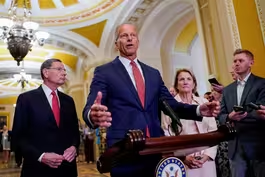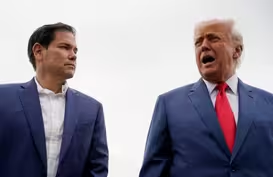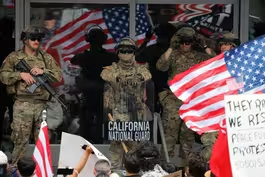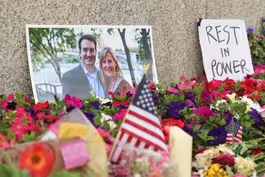
Israel’s war against Iran poses challenges for Trump team
Clip: 6/17/2025 | 11m 50sVideo has Closed Captions
Trump faces difficult choices in support for Israel’s war on Iran
President Trump convened his national security team today to discuss Iran as Israel’s airstrikes continued. The meeting came after Mr. Trump left the G7 Summit early and as the U.S. sent fighter jets and a second carrier strike group to the region. Amna Nawaz speaks with former diplomat Eric Edelman and Karim Sadjadpour, a senior fellow at the Carnegie Endowment for International Peace.
Problems playing video? | Closed Captioning Feedback
Problems playing video? | Closed Captioning Feedback
Major corporate funding for the PBS News Hour is provided by BDO, BNSF, Consumer Cellular, American Cruise Lines, and Raymond James. Funding for the PBS NewsHour Weekend is provided by...

Israel’s war against Iran poses challenges for Trump team
Clip: 6/17/2025 | 11m 50sVideo has Closed Captions
President Trump convened his national security team today to discuss Iran as Israel’s airstrikes continued. The meeting came after Mr. Trump left the G7 Summit early and as the U.S. sent fighter jets and a second carrier strike group to the region. Amna Nawaz speaks with former diplomat Eric Edelman and Karim Sadjadpour, a senior fellow at the Carnegie Endowment for International Peace.
Problems playing video? | Closed Captioning Feedback
How to Watch PBS News Hour
PBS News Hour is available to stream on pbs.org and the free PBS App, available on iPhone, Apple TV, Android TV, Android smartphones, Amazon Fire TV, Amazon Fire Tablet, Roku, Samsung Smart TV, and Vizio.
Providing Support for PBS.org
Learn Moreabout PBS online sponsorshipGEOFF BENNETT: Welcome to the "News Hour."
President Trump convened his top national security aides today for a crucial meeting on Iran, as Israel's air campaign continued for a fifth day.
AMNA NAWAZ: The meeting came after Mr. Trump left the G7 summit early to fly back to Washington and as the U.S. is sending fighter jets and a second American carrier strike group to the region.
(SIRENS BLARING) AMNA NAWAZ: Across Israel today, a now familiar sound, the swell of sirens, signaling incoming missiles from Iran.
A now familiar sight follows, plumes of black smoke after an impact.
Crews raced to put out fires at a bus depot in Central Israel after an airstrike left this crater in the ground.
Nearby explosions were seen around a Mossad building in a separate attack.
Iran claims it hit the intelligence agency's headquarters, which Israel has not confirmed.
To the north, a funeral for a mother and two daughters from the Khatib family killed when an Iranian missile hit their home in the Arab-Israeli town of Tamra over the weekend.
In the meantime, Israel said today one of its strikes on Iran killed a top military commander.
BRIG.
GEN. EFFIE DEFRIN, Israeli Defense Forces Spokesperson (through translator): We eliminated Ali Shadmani, the war chief of staff, the most senior military commander of the Iranian regime.
AMNA NAWAZ: Parts of Tehran now lie in ruins.
In Amin Alley in Northern Tehran, Mojtaba is back at his bakery minutes after learning that his brother was killed in an Israeli airstrike.
MOJTABA, Tehran, Iran, Resident (through translator): People still need bread.
They're not responsible for this war.
This is my front line.
Israel should know that, with its actions, it will not succeed.
Even if hundreds more die, we will still do our duty.
AMNA NAWAZ: Israel pounded Tehran last night and into today, prompting chaos in the capital city as thousands clog the main roads trying to leave.
President Trump has been messaging to Iranians online, last night, warning residents of Tehran to -- quote -- "immediately evacuate," today claiming the U.S. knows where Iran's supreme leader is hiding, but -- quote -- "We're not going to take him out, kill, at least not for now," and later calling for -- quote - - "unconditional surrender from the regime."
Trump met the top security aides after leaving early from the G7 meeting in Canada.
On Air Force One, the president said he's less inclined to use diplomacy after Iran backed out of nuclear talks with the U.S. DONALD TRUMP, President of the United States: They should have done the deal.
I told them, do the deal.
So I don't know.
I'm not too much in a mood to negotiate.
AMNA NAWAZ: He also directly contradicted his director of national intelligence, Tulsi Gabbard, who back in March said this: TULSI GABBARD, U.S. Director of National Intelligence: Iran is not building a nuclear weapon.
AMNA NAWAZ: Testifying on Iran's nuclear capability to the Senate Intelligence Committee.
The president today: DONALD TRUMP: I don't care what she said.
I think they were very close to having one.
AMNA NAWAZ: Meantime, the prospect of U.S. involvement is causing a rift in the Republican Party.
SEN. LINDSEY GRAHAM (R-SC): These are dangerous times.
AMNA NAWAZ: On FOX last night, South Carolina Senator Lindsey Graham called on the U.S. to use force, not diplomacy.
SEN. LINDSEY GRAHAM: Be all in, President Trump, in helping Israel eliminate the nuclear threat.
If we need to provide bombs to Israel, provide bombs.
If we need to fly planes with Israel, do joint operations.
AMNA NAWAZ: But some prominent MAGA Republicans, like former FOX host Tucker Carlson, say U.S. involvement in Iran does not align with their America first agenda.
TUCKER CARLSON, Former FOX News Anchor: I'm really afraid that my country's going to be further weakened by this.
I think we're going to see the end of American empire.
Obviously, other nations would like to see that, and this is a perfect way to scuttle the USS America on the shoals of Iran.
AMNA NAWAZ: Also breaking with the president, Georgia Representative and Trump loyalist Marjorie Taylor Greene, posting on X last night -- quote -- "Foreign wars, intervention, regime change put America last, kill innocent people, are making us broke, and will ultimately lead to our destruction," all while the U.S. deploys more fighter jets to the Middle East to bolster its forces, as the two regional powers continue to trade blows.
Let's delve into this more now with Eric Edelman, who was a career Foreign Service officer and served at high levels in the State and Defense departments in both Democratic and Republican administrations, and Karim Sadjadpour.
He's a senior fellow at the Carnegie Endowment for International Peace, where he focuses on Iran and U.S. foreign policy toward the Middle East.
Gentlemen, thank you for joining us.
Eric Edelman, we have seen President Trump's language towards Iran really ramp up over the last few days of Israeli strikes, threatening the ayatollah outright, calling for surrender.
What do you see here?
Is this a U.S. that's pushing for talks or that's preparing for more of a military effort in some way?
ERIC EDELMAN, U.S.
Undersecretary of Defense for Policy: Well, I think the president obviously has expressed in the past that he would prefer a diplomatic solution, but has been frustrated in that effort for a variety of reasons.
I think now the administration and the president and his colleagues today are facing up to a very difficult reality, which is that Israel has done enormous damage to Iran's nuclear program, but it is not able to completely eliminate it because of a lack of certain military capabilities, which the U.S. possesses.
And so the challenge he now faces is whether the worst outcome would be to leave an Iran that has been damaged, humiliated, but still has the capability of reconstituting its nuclear program.
I mean, this is a country that since the revolution has been founded on the notion of "Death to America" and "Death to Israel."
So, in that sense, the American and Israeli faith are entwined at this point.
AMNA NAWAZ: I want to ask you more about the U.S. capabilities in just a moment.
But, Karim, to bring you in here, tell us about how President Trump's messages are -- to evacuate Iran, calling for the surrender, how are they being received by the regime and by the Iranian people?
Are they seeing that as pressure to negotiate or something else?
KARIM SADJADPOUR, Carnegie Endowment for International Peace: Well, the population at the moment is living in a state of profound insecurity and fear.
They're really spectators.
They're not participants in this.
And I think there was an initial hope that maybe these attacks could trigger the population to rise up.
But as long as they're under aerial bombardment and they're being told to evacuate, that's not a high likelihood.
I think the supreme leader is in the most difficult position he's ever been.
He's an 86-year-old man, has limited mental and cognitive bandwidth at this point.
And he essentially has two terrible choices.
He's being told by President Trump that he either needs to agree to total surrender, which for any dictator that wants to be feared by his own population is an outcome which cannot devastate consequences, or he could pursue the path of defiance and resistance.
And he's threatened as much tonight, saying that Iran plans to retaliate.
And that could lead to his external destruction.
So Ayatollah Khamenei is in the most difficult position he's ever been in, in his 36 years as supreme leader.
AMNA NAWAZ: So, Eric, given that context, you mentioned Israel not having the capability itself to fully take out Iran's nuclear program.
What would the U.S. be able to do to help them do that?
And should the U.S. take that action?
ERIC EDELMAN: Well, the U.S. has a capability, the GBU-57, which is a deep earth-penetrating bomb.
It's a 30,000-pound bomb that can drill down into 200 feet of earth and rock.
And since the remaining major Iranian facilities are built into mountains, whether you're talking about the Fordow facility or the so-called Pickaxe Mountain facility, those would have to be destroyed by that kind of ordinance.
And, as far as I know, that ordinance can only be delivered by American B-2 bombers.
AMNA NAWAZ: And is that something, is that a step that you believe the U.S. should take in order to fully wipe out the nuclear program?
What would you recommend to the president at this point?
ERIC EDELMAN: I think at this point, the idea of allowing Iran to have a residual capability to reconstitute its nuclear program, given everything that's happened, would be catastrophic for the region, for Israel and for the United States.
So I'm inclined to agree with Senator Graham.
I don't think this is something actually we can -- a capability we can give to Israel because the B-2 bombers are -- they're small in number and they're a part of our nuclear triad or the air-breathing leg of our nuclear triad.
I don't think it's something we can just lend to the Israelis.
So, I think, unfortunately, the onus will be on us if we want to see this program destroyed.
And this is not just, by the way, something that President Trump believes.
This is -- the idea that Iran cannot have a nuclear weapon is something that every American president going back to the late '80s, early '90s has said.
So I'm not sure we have much choice at this point.
AMNA NAWAZ: Karim, what's your take on that?
Do you agree that the U.S. should get involved in that way?
And what would the impact of that kind of us intervention be?
KARIM SADJADPOUR: You know, I think Eric would agree that there's profound risk of inaction and there's obviously risks of action as well, as Eric laid out well.
If the regime remains intact and that nuclear facility, which is half-a-mile underground in Fordow remains intact, there's a real danger that, when the dust settles, they will try to race for a nuclear weapon.
So that's the risk of inaction.
But the risk of action is oftentimes much more unpredictable, and it can have consequences for decades to come, whether that's Iran unleashing everything it has in the Middle East, destabilizing Persian Gulf, destabilizing global trade, or it's the impact that it has on Iran's internal politics.
These types of actions and interventions oftentimes have unforeseeable consequences.
So I'm reminded of something that Henry Kissinger once said, that, when you're in government, a lot of the big decisions are 51-49.
And I think this is going to be an incredibly consequential decision, which will have negative externalities either way.
AMNA NAWAZ: Karim, I have less than a minute here, but I just have to ask, do you see the real possibility for regime change here in Iran?
KARIM SADJADPOUR: That's within the realm of possibilities, but one thing we would need to look for are signs of internal fissures within the regime, defections, fissures.
Regime instability and regime implosion requires not only popular tumult, but those types of fissures.
So far, we haven't seen it happen, but certainly this is a population in Iran, I would estimate up to 80 percent of Iranian society would like to live under a government whose ethos is not "Death to America" and "Death to Israel," but long live Iran.
AMNA NAWAZ: Karim Sadjadpour and Eric Edelman, thank you both so much for joining us.
We appreciate your time.
KARIM SADJADPOUR: Thank you.
Can Trump’s ‘big, beautiful bill’ pass the Senate?
Video has Closed Captions
Clip: 6/17/2025 | 5m 20s | Can Trump’s ‘big, beautiful bill’ make it through the Senate? (5m 20s)
Former Fulbright board member on Trump’s interference
Video has Closed Captions
Clip: 6/17/2025 | 6m 18s | Why Fulbright board members resigned in mass last week (6m 18s)
How AI startups hope to help feed India
Video has Closed Captions
Clip: 6/17/2025 | 8m 4s | Can AI help solve India’s food and water insecurity? (8m 4s)
How immigration crackdowns are affecting Latino communities
Video has Closed Captions
Clip: 6/17/2025 | 10m 16s | Pastors share how immigration crackdowns are affecting their communities (10m 16s)
News Wrap: Appeals court hears Trump National Guard case
Video has Closed Captions
Clip: 6/17/2025 | 4m 30s | News Wrap: Court considers Trump’s California National Guard deployment (4m 30s)
Understanding political violence, and how to fix it
Video has Closed Captions
Clip: 6/17/2025 | 6m 5s | Understanding the root causes and possible solutions for rising political violence (6m 5s)
Providing Support for PBS.org
Learn Moreabout PBS online sponsorshipSupport for PBS provided by:
Major corporate funding for the PBS News Hour is provided by BDO, BNSF, Consumer Cellular, American Cruise Lines, and Raymond James. Funding for the PBS NewsHour Weekend is provided by...

















